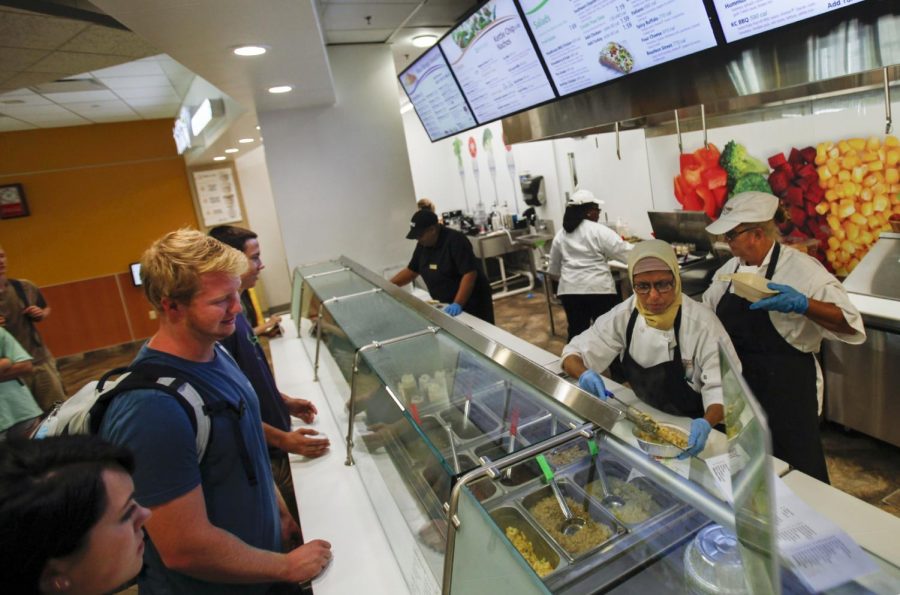WKU signs letter of intent with Aramark Food Service
March 29, 2017
WKU has signed a letter of intent for a 20-year contract with Aramark Food Service for dining and catering services at WKU. Both sides will continue to negotiate details of the contract until it begins on July 1. The contract is expected to be worth $20 million a year, according to a press release.
Under the new contract, all full-time students not already on a meal plan will be required to pay $75 per semester, which may be deducted from the cost if they choose to purchase a meal plan later.
Brian Kuster, vice president of student affairs, said this applies only to “face-to-face” students who take 12 hours or more at Bowling Green’s Main Campus.
“They’re most likely already eating a meal a week or so, you know, in one of the facilities,” Kuster said. “It just supplements issues we know students already have as far as making healthy choices, having those options.”
The contract includes a “significant renovation” worth $35 million for Garrett Conference Center, to begin in the summer of 2018.
“Quite frankly, [the $75 fee] is part of that financial model to generate the $35 million to renovate Garrett Conference Center,” Kuster said.
Students may use the money to purchase food at any campus location on campus. If not all of the money is used, it will roll over to the next semester, Kuster said.
Louisville sophomore Lauren Goldener said she wasn’t happy to hear about the new fee.
“I just think it doesn’t make sense if you don’t live on campus,” Goldener said. “I think if you live on campus it’s fine to require it, but if you don’t live on campus, it seems unfair.”
Goldener lives on campus now without a meal plan and is planning to move off campus next semester.
With the new contract are plans for new food options and spaces in Downing Student Union and Pearce-Ford Tower Food Court as well as “a new 24-hour food operation” in Hilltopper Hall, which is currently under construction and scheduled to open in the 2018 Fall semester.
“It will most likely be more like a smaller version of Fresh Food,” Kuster said about the 24-hour operation. “We’re still working through what exactly that will be.”
Kuster said details about other new restaurants have yet to be finalized, but plans are for there to be increased options for students on campus, as well as improving line wait times. Kuster said students will be surveyed about what food options or restaurants they would like to see in the future.
At Tuesday’s SGA meeting, Campus Improvements Committee Chair Zach Jones said he did his best to represent the student body as a whole when voting on the bid.
“There are costs and benefits to each plan, but this is definitely the best,” he said.
Under WKU’s current contract, all catering must be done through Aramark. The new contract allows Aramark “the first right of refusal,” Kuster said, which means Aramark may decline to cater a university-funded event based on cost-effectiveness. People seeking catering for smaller university-funded events may use other pre-approved vendors, for which WKU is currently seeking proposals.
Aramark has been WKU’s provider of food services for the past 20 years. It replaced Marriott in 1997, which was WKU’s first food service company, after the university decided to put the contract out for a bid.
WKU released a request for proposals, or RFP, from outside vendors last spring when its contract with Aramark ended and received responses from Aramark, Sodexo and Chartwells.
According to a previous Herald article, releasing the RFP came with the expectation that each company would include proposals for renovation and possible expansion of Garrett Conference Center in their responses to the RFP.
According to the article, Garrett has not had any major updates since it was built in 1951, and the renovations would address current accessibility issues with the building.
Kuster said the Garrett renovation design team has not met yet, and there is no definite time for when renovations are expected to be completed. Kuster said the university may set up a temporary structure to take its place for use during renovations, similar to what was built on South Lawn during the renovations to DSU.
“We really feel like the proposal that Aramark brought to us really brought more to the table,” Kuster told the SGA on Tuesday, “more financially, for our students—and we have 20 years of history working with them.”















